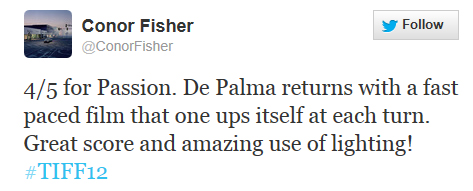
 Hello and welcome to the unofficial Brian De Palma website. Here is the latest news: |
|---|
E-mail
Geoffsongs@aol.com
-------------
Recent Headlines
a la Mod:
Listen to
Donaggio's full score
for Domino online
De Palma/Lehman
rapport at work
in Snakes
De Palma/Lehman
next novel is Terry
De Palma developing
Catch And Kill,
"a horror movie
based on real things
that have happened
in the news"
Supercut video
of De Palma's films
edited by Carl Rodrigue
Washington Post
review of Keesey book
-------------
Exclusive Passion
Interviews:
Brian De Palma
Karoline Herfurth
Leila Rozario
------------
------------
| « | September 2012 | » | ||||
| S | M | T | W | T | F | S |
| 1 | ||||||
| 2 | 3 | 4 | 5 | 6 | 7 | 8 |
| 9 | 10 | 11 | 12 | 13 | 14 | 15 |
| 16 | 17 | 18 | 19 | 20 | 21 | 22 |
| 23 | 24 | 25 | 26 | 27 | 28 | 29 |
| 30 | ||||||
De Palma interviewed
in Paris 2002
De Palma discusses
The Black Dahlia 2006

Enthusiasms...
Alfred Hitchcock
The Master Of Suspense
Sergio Leone
and the Infield
Fly Rule
The Filmmaker Who
Came In From The Cold
Jim Emerson on
Greetings & Hi, Mom!
Scarface: Make Way
For The Bad Guy
Deborah Shelton
Official Web Site
Welcome to the
Offices of Death Records
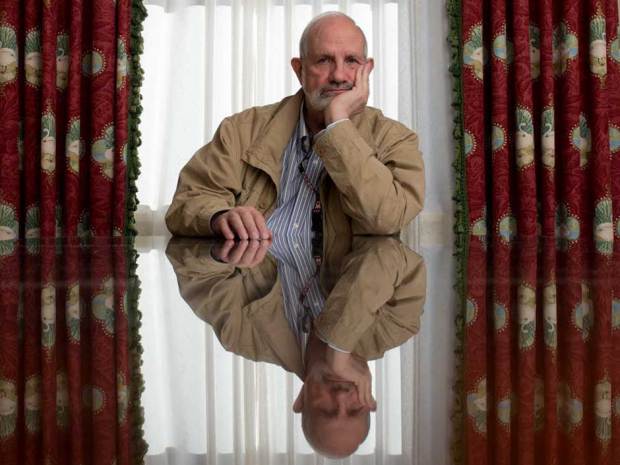
"I’ve freelanced all my life,” De Palma told Semley. “I never had a safe office to go to. No insurance waiting for me. I started making independent pictures, scrapping together money. Here, at the end, it’s kind of the same thing.”
"EVERY OTHER ART FORM HAS EMULATED THE MASTERS OF THE PAST"
The discussion turned to the frequent criticism that De Palma rips off from Hitchcock:
Semley writes that "De Palma is aware of his own critical recuperation, if a little confused by it." He then quotes De Palma: "I think I’m making a movie that everyone’s going to have a lot of fun with. And then I’m told it’s only for the De Palma fans who are going to see it at three o’clock in the morning."
"IT'S NOT LIKE I HAVE A PAINT BOX OF THINGS I WANT TO STICK IN MY MOVIES"
Metro World News' Ned Ehrbar interviewed De Palma in Toronto, and got some very energetic responses:
That’s right. I mean, it’s like with Rachel — that phone call. When she gets the phone call about the guy who cancels the date, she heaved the phone [across the room]. I forget which take that was. (laughs) Wow! Unbelievable. And then she picks up the phone and figures out whatever she’s going to do next. She calls up an old lover and, “You want to come over?”
There is a lot of fluid female sexuality in this movie.
I just let the girls go with the scene and just sat back to see what would happen. The way that Dani [played by Karoline Herfurth] offered herself to Isabelle [played by Rapace] — “Kiss me!” — and then starts to undress her! (laughs) All the girls, all their intimate stuff, was all improvised. They just play it. They play it like they would play it if… They make it as real as possible. If something’s not working, we try something else, but they were all fantastic, and it was just fascinating to watch them.
Rachel McAdams’ character feels a lot like a grownup version of her character from “Mean Girls.” Had you seen that film already?
Of course. Oh, I knew Rachel could play it. I’d seen her play it before. Playing a dark, manipulative lady is a hell of a lot of fun, and she had a lot of fun doing it.
You use a split-screen during pivotal scene in the film. How have the reactions been to that?
It seems to work. Everybody seems to talk about it a lot. It’s not like I just have a paint box of things I want to stick in my movies. I look at the scene, and I think what’s the best way to shoot this? Also, I’ve never done a murder where you have a split-screen and you have these two fantastically beautiful women on each side, and then suddenly a knife slashes somebody’s throat and you see somebody with a mask splattered with blood. I’d never done it before.
Have you heard anything from the makers of viral video you recreated in the film?
I haven’t heard anything. But yes, I saw it on the Internet and I basically copied it for the movie. It went viral, everybody thought it was real, but in reality it was two advertising executives [in Australia].
You didn’t have to reach out to them about using the idea?
No. I think advertising copies everything, basically. I don’t think they get worried about being copied themselves.
What’s you take on festival audiences?
Oh, a festival audience is the best audience in the world, especially for a director like myself. There will be De Palma fanatics out there in the audience, so it’s not like you’re in front of a hostile audience. They’re the kind of people that love your movies and want to see what you’re doing. And Toronto especially has very enthusiastic audiences. Needless to say, I’ve brought so many movies here to the festival and seen the audiences’ reactions.
What do you like to see yourself at film festivals?
I go to see the obscure movies that will never get into Manhattan. I do it mostly by reading the descriptions, looking at the trailers, maybe getting some information or insights from some of my friends, and I just keep going and watching as much as I can.
RACHEL: "I FELT LIKE THE ONLY PERSON I COULD DO THIS WITH WAS NOOMI"
Entertainment Weekly's Solvej Schou separately interviewed McAdams (by phone) and De Palma (at the Fairmont Royal York Hotel) in Toronto. "I was intimidated by Brian at first,” McAdams told Schou by phone. “People have certain kinds of movies, and I thought he would be a certain way, but he wasn’t. Brian watched everything Noomi and I did. I think he does that with everyone. He’s really interested in his actors. He obviously loves film." McAdams also delved into her character: "Playing Christine was a challenge. She’s kind of wickedly delicious, but not too too much. Those characters can be more fun than the ingénue, the leading lady, where there’s the expectation of having the audience like you. I saw the film not too long ago, and I found the sexuality quite restrained, even for Brian De Palma. I found it more about possession, and not about wanting to have sex with each other, and be physical, but wanting to possess the other. I think he’s dealing a lot with vanity, and narcissism. You want the other person to reflect what you want to be. I felt like the only person I could do this with was Noomi. It certainly made it easier. I was nervous!”
De Palma revealed to Schou that the director friend who suggested he take a look at Rapace was Steven Shainberg, who had been considering Rapace for his film The Big Shoe. "He gave me all her Swedish DVDs, and I started to look at them," De Palma told Schou. "There’s some really wild stuff in there. He said, 'This is a really bright girl, and you should talk to her.'"
De Palma also discussed how the two lead actresses brought their own game to his film set. "They came with their own dynamic. They worked together on Sherlock Holmes 2, they knew each other extremely well, and they had this thing between them, that you could see them kind of vying, and they just brought it right into the characters. When we went into rehearsal, I had to watch what they were doing, and they did all kinds of things that surprised me."
When asked by Schou if he has high hopes for Passion, De Palma replied, "Yeah, because I think it’s very commercial. It’s a lot of fun. It’s a good mystery, the girls are terrific. I haven’t done a movie like this in a while. Raising Cain was very successful. We made it for about $10 million. The budget on Passion was $25 million. I made more money on Raising Cain than I made on Mission: Impossible. I think Passion is going to be very successful because it’s fun. I saw it with the Venice audience. You know when they’re watching a movie, this [mimes typing on a cell phone] did not go on. I only saw one cell phone light go on. It was always the same person, who was obviously texting."
When De Palma explained that he wanted Jose Luis Alcaine for Passion because "he knows how to photograph women," Schou asked De Palma if beauty can sometimes overpower nuance. "Are you kidding?" said De Palma. "In contemporary cinema?? I was looking at Rust and Bone, and there’s this gorgeous woman, Marion Cotillard, in a dark corner, and maybe you see the edge of her nose, with no makeup. I made a movie about a stylish business world, and I want the women to look good! … Rachel looks magnificent, and Noomi is the black pariah, she’s always in black, with these bangs."
And in this passage, De Palma discusses his view that by the time they reach 60 years of age, most film directors have already done their best work:
I’m just recording what I know from what I read, and studying directors’ careers. Most directors did their best movies in their 40s and 50s. It’s a debilitating profession. It’s got all kinds of ways to screw you over. Being able to hold the power, doing what you have to do, is incredibly difficult, and you’re lucky if you knock off a few masterworks in that period. You bring up Woody Allen. Is anything better than [1979’s] Manhattan? I don’t think so. With Clint Eastwood, he’s never made a movie better than [1992’s] Unforgiven. That’s the reality. … Especially when you’re being reviewed in your own time frame, they’ll say, “It’s never better than [1980's] Dressed To Kill or Carrie.”
What do you consider your own peak, the best of who YOU are?
That’s really hard to say, the best of who I am. Most of the movies you thought you gave your heart and soul to were badly reviewed when they came out. You do take the arrows and slings of misfortune, and it affects your ability to make movies.
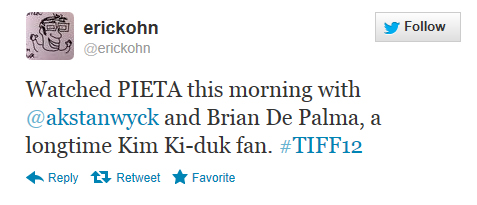
A remake of the solid Alain Corneau corporate thriller Love Crime, De Palma plunges without hesitation into the iconography, audience expectations, and conventions of noirs, sex thrillers, corporate intrigue, post-Hitchcock films and Brian De Palma movies themselves, retaining the shell appearance of all of these things but hollowing them from the inside out. The result is something out of late Resnais—a study of a study. And that study, of course, is of the cinema image. Remember how Rebecca Romijn watches Stanwyck in Double Indemnity at the beginning of Femme Fatale, as if taking notes? The characters in Passion have taken notes from Femme Fatale: an abstraction based on a fiction based on a fantasy. It is complex, dextrous, and awkward: Rachel McAdams plays and acts the seductive, power hungry blonde in a performance that is like a kabuki imitation of the type; Noomi Rapace is her underling, friend, object of love and obsession, our heroine and, therefore, at first, directed to act “normally.” (This film's skewering of cinematic female friendship is twisted, sinister, cynical and terribly interesting.) Like in Paul Thomas Anderson's The Master, but far more knowingly, cleverly, the director is here forcing a confrontation between two entirely different acting styles and kinds of characters. In Passion, one is ostensibly a hollow signifier, the other our, the audience's, psychological subject, person of empathy. Except the film, lurchingly structured in three fascinating sections, with the middle one styled radically differently, introduces a third character, another woman (which brings the collection to: a blonde, a brunette and a redhead), who begins to appear more normal as Rapace's character enters deeper into the story and begins to be abstracted by the movements and conventions of her plot. We lose our focus on one as another comes in. Where the film leaves us, after developing this schema and then following its "thrills" to the end, is truly disturbing.
I feel like I could talk about this movie forever—it comes so welcome after, in Cannes, suffering through the shockingly disrespectful cultural and cinematic ignorance on display in another ostensibly generic, and homage filled film, John Hillcoat's deplorable Lawless. De Palma's film is suffuse with a deep knowledge film history and aesthetics, and, in yet another remarkable engagement with digital video (after his first foray in his last film, Redacted), has constructed a film that questions our expectations, understanding, interest, empathy and perspective on them. The lucid, confrontational clarity of the digital images renders the film's hermetic artifice—despite being often photographed on location—even more dissonant, heightened and abstract. The archness of the film is absolute. It is a work of cinephilia but one which remarkably takes the form of a step forward—it's an object that exists in the continuum of the subject that it is studying.
I know you liked this film too, so I'll perhaps let you take the baton from my ramblings, because I haven't even begun to talk about De Palma's use of video in this, his close-ups which appear like nothing else in the festival, his total understanding of what's interesting in Rapace's face, of the startling falseness of McAdam's sub-Dressed to Kill simulacrum, the film's perverse and knowing humor and absurdity, its roleplaying, the images within images (him and Ferrara both, loving Skype video calls!), including a mini cellphone cam movie that is pure De Palma and also an advertisement for jeans. What else, what else? Oh, to leave you with another favorite: the film's one split screen sequence, a magnificent anti-set piece, yet so clever, placing a ballet performance in one screen with uninteresting plot mechanics in the other—only to culminate in a murder. Can you tell I'm excited? This film is strange and rich. I'm sorry I can't be more coherent and structured in this, as it appeared a lot of people didn't like if not downright hated or laughed at this movie, which I think is a mistake."
And then from Fernando F. Croce:
"Ah, Passion. Perhaps not the film of the festival for me (that’s still Like Someone in Love), but certainly the one that most tickled my cinephilia. Like Kiarostami’s film, it’s a wondrous feat (a series of feats, really) of misdirection. Who are these characters who look like Rachel McAdams and Noomi Rapace and Karoline Herfurth but are actually gimlet-eyed projections from cinema’s past? Abstractions, sure, yet when do abstractions exude such a feeling of heated flesh, of shards of fantasies being moved around the screen like drops of mercury? The layers upon layers of De Palma’s artifice dare us to find out. It’s a crazy, thorny spiral of a movie, not “campy” but funny. Think of McAdams, done up like a parody of Grace Kelly (her blonde hair for some reason looking like a wig) in her wood-paneled office with the word “IMAGE” spelled in red, blocky letters behind her. Or of Rapace ramming her car into a Coke machine (De Palma’s Godardian side is always present), followed by a crying jag and a sudden rain that are, like everything on screen, not what they seem. (A camera movement reveals the fire-alarm sprinkler drenching the character from above, and, of course, the security lenses recording it all.)"
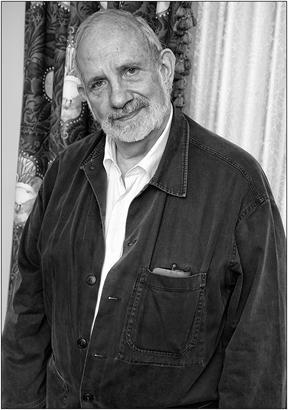 From a BBC Toronto round-up:
From a BBC Toronto round-up:With the film poised to go international, he was plunged into a non-stop round of meetings and interviews.
"Toronto reminds me of school trips to Minehead where you're in some place new and exciting," he told me. "The only problem is you can't escape from the teachers."
At a different stage of his career, Brian De Palma was also working hard. Drumming up interest in his erotic thriller Passion - currently without a distributor in the US or UK - the Scarface and Carrie director held court with the air of a man looking on the bright side on working away from the studios.
"The studios would rather work with young directors they can control," the veteran film-maker said. "They don't want someone like me being old and crotchety and demanding final cut."
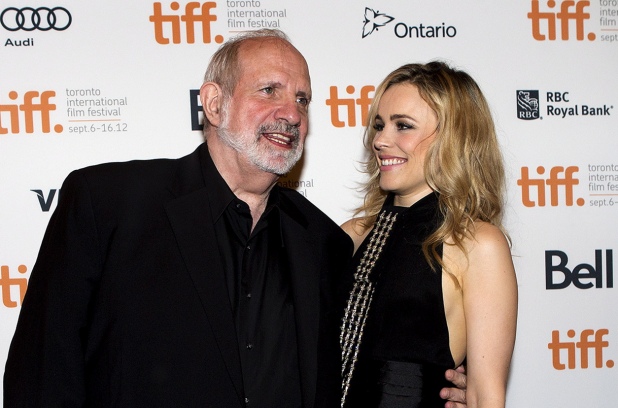
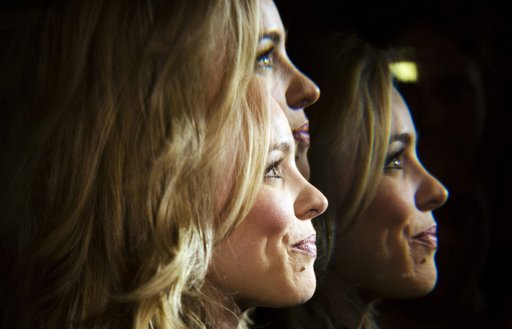
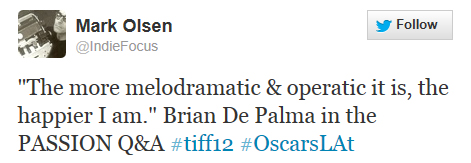

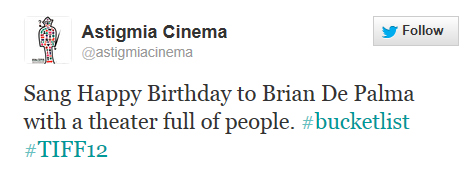
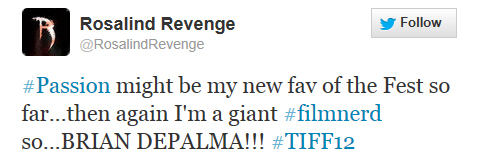
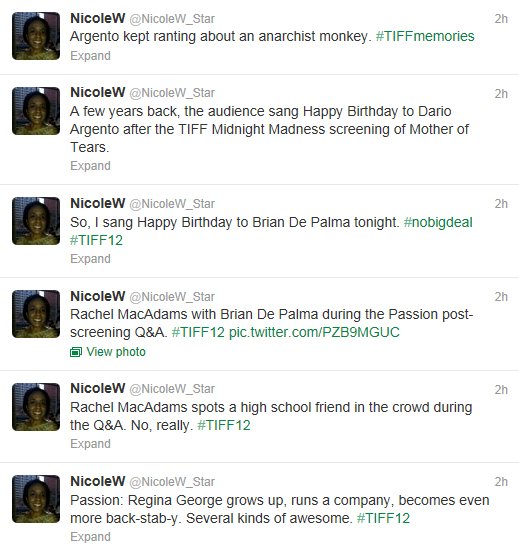
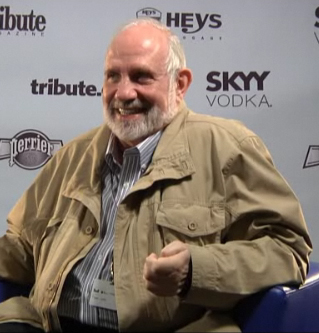 Tribute.ca's Bonnie Laufer posted a video interview with Brian De Palma today, and he shared a couple of fun stories about making Passion that had him laughing as he spoke. [Possible mild spoilers here] Providing examples about how Rachel McAdams and Noomi Rapace sort of took control of building this relationship on screen, De Palma talks about how, after "annihilating" Isabelle (Rapace), Christine (McAdams) comes up to her and says, "Why don't we just kiss and make up?" After laughing a bit, De Palma continues, "And Noomi grabs her like a Mafia Don, sending someone to his death, and really kisses her! I said [putting head in hands], 'Oh, my God'." De Palma told Laufer that was a "Wow" moment, and then continued, "There was another scene which I don't think you can use on your television program. When she [Christine/Rachel] comes in the room to confront Dani... [laughing thinking about it] When she comes in and says, 'We all know what you're after. You're after Isabelle's'-- now my line is 'ass' [the way De Palma wrote it]. Rachel came in and said, 'You're after her cunt.' [A gasp from Laufer] And I went, 'Holy mackerel.'"
Tribute.ca's Bonnie Laufer posted a video interview with Brian De Palma today, and he shared a couple of fun stories about making Passion that had him laughing as he spoke. [Possible mild spoilers here] Providing examples about how Rachel McAdams and Noomi Rapace sort of took control of building this relationship on screen, De Palma talks about how, after "annihilating" Isabelle (Rapace), Christine (McAdams) comes up to her and says, "Why don't we just kiss and make up?" After laughing a bit, De Palma continues, "And Noomi grabs her like a Mafia Don, sending someone to his death, and really kisses her! I said [putting head in hands], 'Oh, my God'." De Palma told Laufer that was a "Wow" moment, and then continued, "There was another scene which I don't think you can use on your television program. When she [Christine/Rachel] comes in the room to confront Dani... [laughing thinking about it] When she comes in and says, 'We all know what you're after. You're after Isabelle's'-- now my line is 'ass' [the way De Palma wrote it]. Rachel came in and said, 'You're after her cunt.' [A gasp from Laufer] And I went, 'Holy mackerel.'"'MEAN GIRLS'
De Palma told the Winnipeg Free Press' Michael Oliveira that "Rachel McAdams is a fantastic actress. I've been watching her for years, but especially thought she'd be good for this part because of seeing her in Mean Girls. She really did an incredible job of playing this very manipulative executive." Oliveira writes that while Rapace has a nude scene, most of the sexual content in the film is subtly implied. "I didn't think (gratuitous sexuality) was necessary," De Palma told Oliveira. "It is erotic but it isn't really explicit." Regarding his lead actresses, De Palma said, "They were not afraid to do anything, basically. They felt very secure and confident in what they were doing and I just gave them the space to interact as exciting and dramatically as possible. They would do it all kinds of different ways and I was sort of led by what was happening."
KEY IDEA FROM CORNEAU FILM
Back to Laufer's video interview, De Palma said the key idea from the Alain Corneau film is this: "The worst thing one woman can do to another is humiliate her in public." Laufer asks De Palma about Kimberly Peirce's upcmoming Carrie remake, and De Palma talks about how he has no problem with filmmakers doing remakes, just like plays are constantly reworked. He also reminds her that his Scarface is a remake of a very good Howard Hawks film, and, later, relays a funny story from the making of his version. Back to Peirce: De Palma says he met her in Paris around the time Boys Don't Cry was released, and that they used to go to the theater together around seven or eight years ago.
'HEAT' REMAKE BEING RESET IN NICE, FRANCE
Asked what he is working on next, De Palma tells Laufer about the remake of Heat, "a lost movie of the seventies that was written by William Goldman that Burt Reynolds was in. And I think the first day of the shoot, Burt Reynolds slugged the director, so it didn't come out very well. In any event, it's in a casino town, it's about an enforcer. Jason Statham's going to do it, and we're resetting it all in Nice."
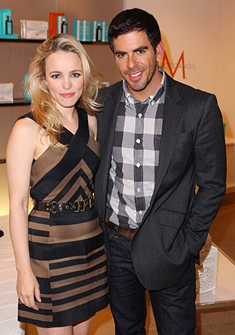 Rachel McAdams and Eli Roth are pictured here from earlier today (Tuesday) at the Variety Studio at TIFF. McAdams did participate in an interview while there, so hopefully this means she will be on the Variety & Ortsbo Live In Toronto broadcast along with Brian De Palma tonight at 7pm eastern. Roth, meanwhile, caught a screening of De Palma's Passion earlier this week, according to The Canadian Press. Roth is at the Toronto fest to promote a new film he co-wrote and appears in, Aftershock, but told Nick Patch, "All I want to do in my free time is see movies. It's such a tease. It's torture, actually, to know that these movies are playing in theatres and you can't go see them." Roth also managed to catch screenings of Paul Thomas Anderson's The Master and Harmony Korine's Spring Breakers.
Rachel McAdams and Eli Roth are pictured here from earlier today (Tuesday) at the Variety Studio at TIFF. McAdams did participate in an interview while there, so hopefully this means she will be on the Variety & Ortsbo Live In Toronto broadcast along with Brian De Palma tonight at 7pm eastern. Roth, meanwhile, caught a screening of De Palma's Passion earlier this week, according to The Canadian Press. Roth is at the Toronto fest to promote a new film he co-wrote and appears in, Aftershock, but told Nick Patch, "All I want to do in my free time is see movies. It's such a tease. It's torture, actually, to know that these movies are playing in theatres and you can't go see them." Roth also managed to catch screenings of Paul Thomas Anderson's The Master and Harmony Korine's Spring Breakers.